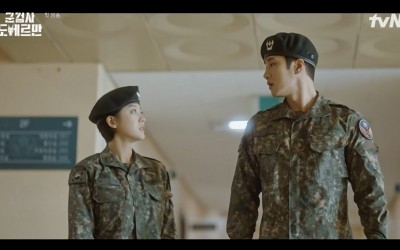Recap "Through the Darkness" Episode 7-8
Using the serial killer Richard Chase as a case study, Ha-young explains that the murderer they’re chasing likely kills for pleasure and satisfaction, not out of anger.
When Ha-young returns home after work, the lights are off and the apartment is empty. He calls his mother, but she doesn’t pick up the phone.
We see the stab-and-run killer attack a woman as she walks home, only running off when illuminated by a passing car’s headlights. Back at home, the killer smiles eerily as he settles into bed, relishing the thrill of his most recent murder. Shivers.

Luckily, Ha-young’s mom is safe; it turns out she just popped out for a while to grab the things she left behind at the bakery. Together, they set up a memorial altar for Ha-young’s late father, and Ha-young pays his respects. It’s also Ha-young’s birthday, and his mother tells him she’s proud of him for becoming a police officer who can read the hearts of others.
The next morning, Ha-young is greeted by party poppers upon walking into the office. Aww, Young-soo and Woo-joo break out into a cheesy birthday song and dance, and it puts a wide smile on Ha-young’s face.

April, 2004. While on the way to a prison interview, Young-soo looks through a stack of case reports, and one in particular catches Ha-young’s attention. It’s one of the stab-and-run killer’s victims, who had been gravely injured with a camping knife. That detail makes Ha-young recall an earlier case, and he calls Woo-joo to search up previous reports. Woo-joo finds two similar cases, with the same type of knife, same neighborhood, and similar victim profile.
At the police station, Tae-gu and Il-young have also caught on to this trail. They suspect that the serial killer they’ve been chasing might have changed his M.O., but they’re also stumped by the obvious differences. Still, the victims’ description of the culprit — a short man with a small build — fits the man they’ve been looking for.


Both pairs follow up on the reports, and they find out that the murderer is balding and wore sneakers, not hiking boots. Ha-young doubts that it’s the same serial killer, since the weapon, time, and M.O. don’t match. Someone as cautious as the sledgehammer killer wouldn’t follow his victims to their homes, creating the possibility of witnesses.
Young-soo theorizes that the victims weren’t killed simply because the attacker hadn’t been able to finish the job, meaning that they may have a second serial killer on their hands. Ha-young and Young-soo suspect that the victims’ survival may also cause the killer to escalate his methods, and unfortunately, they’re right. The killer switches to a larger kitchen knife, and his next victim succumbs to her stab wounds.

In the meantime, we catch up with the sledgehammer killer, GU YOUNG-CHUN (Han Jun-woo), who’s switched to murdering call girls. He invites one into his apartment late at night, and the next morning, he steps out of the bathroom satisfied and spattered with blood.
Some time later, though, he ends up apprehended for the call girl murders, as well as the elderly residential murders. The police had eventually acted upon the pimp’s police report, and they’d found the victim’s belongings in Young-chun’s possession.
Young-chun’s statements are incoherent and inconsistent, but he voluntarily offers up a written confession of his murders and where he buried his victims, totalling up to 18 killings. However, a sudden seizure gives Young-chun an excuse to get out of his handcuffs. He uses that to his advantage, escaping out a bathroom window.


Thus begins a desperate chase down the streets. Young-chun picks up a pair of gardening shears along the way, and he uses that to stab Tae-gu after catching her off guard. He kicks her viciously once she’s down, but thankfully, Ha-young arrives in time to pull him off her. That gives Tae-gu space to get up, and she makes quick work of Young-chun even with her wound, cuffing him herself.
This incident spurs Tae-gu to reflect on herself, and she later admits to Ha-young that she’s misunderstood him. Years ago, when he’d saved her from the suspect that had pulled a knife on her, Tae-gu had felt terribly afraid. Having someone bear witness to that vulnerable moment had left her feeling ashamed. Ha-young points out that detectives are ultimately still human; everyone faces such moments of terror, including himself. Seeing Ha-young in a new light, Tae-gu sincerely thanks him.


Young-chun is taken back to the interrogation room, where he demands for the highest-ranking officer, since that’s only befitting of his status as the suspect to eighteen murders. Figuring out a plan to combat Young-chun’s arrogance, Ha-young hands superintendent Joon-shik a hefty pile of papers to give the impression that the police already have a lot of information on Young-chun.
Joon-shik coddles Young-chun as per Ha-young’s advice, lulling him into a false sense of security before sharply cornering him. It successfully unnerves Young-chun in no time. The bodies of his victims are dug up, closing the case at long last.


At the detention center, Ha-young and Young-soo interview Young-chun to find out his motives. He admits that the APB made him lay low for a while, which supports Ha-young’s profiling of him as a cautious person. “Perfect crimes require careful planning,” Young-chun says. Ha-young counters that there are no perfect crimes, only for Young-chun to retort that they failed to catch him. He claims that he was only convicted because he confessed.
Young-chun tells them that he chose houses near a church for his murders, to prove that he, not God, decided whether those people lived or died. Comparing the bathroom threshold in his apartment to the line between the living realm and the underworld, Young-chun smugly says that nobody who crossed that threshold made it out alive.

It’s an interesting examination of religion: while Ha-young finds solace in his faith, Young-chun has twisted it to vindicate his vicious murders. Young-chun’s narcissism clearly stems from his superiority complex, and he constantly tries to overcompensate for the feeling of being looked down upon by others.
Young-chun sneers that the police are corrupt, the wealthy obtain their riches illegally, and women live promiscuously. They ought to be punished, so Young-chun thinks of killing them like his job.
Insightfully, Ha-young asks if that’s why Young-chun chose victims weaker than himself. “You don’t have the right to kill them, so don’t try to justify your gruesome actions with those ridiculous excuses,” Ha-young says. “You’re nothing but a pathetic murderer.”


After the interview, Ha-young and Young-soo head for dinner. Ha-young immediately downs a shot of soju, worrying Young-soo. Clearly affected by Young-chun’s graphic retelling of his murders, Ha-young quietly asks Young-soo why he chose him for this job. “If I get drunk, will I feel a little better?” he asks, smiling forlornly. Oh, Ha-young…
One serial killer may have been put behind bars, but the other is still on the loose. The stab-and-run murderer watches gleefully from the street as an apartment burns. It looks like he’s changed his M.O. yet again, and I suspect it’s only going to get more brutal from here as his greed for the thrill grows.

Over a team dinner, Young-soo muses that in their efforts to peer into the hearts of the evil, their own hearts are running on empty. Nothing seems to fill that void, so he proposes that they share the burden of it together as a team. He tells Ha-young that while his question that night weighed heavily on him, it also made him feel glad, since it felt like Ha-young was finally opening up to him.
Encouraging him to let his feelings show instead of bottling everything up, Young-soo reassures him that the team has his back. Ha-young smiles, agreeing to try. Then he calls Young-soo out for being cheesy. Haha, aww.


I feel like I comment on this every week, but I really love that despite its tight pacing and suspenseful action, the show still takes the time to show the growth of our characters. The slowly-but-surely developing bonds between our team are so heartwarming to see, and the way they bring a little light to one another’s lives is a welcome respite amidst the bleakness of their job.
After four years of working together, our main trio seems to have settled into a comfortable dynamic. Woo-joo has finally managed to convince Ha-young to speak informally to him, and I love that they’ve basically teamed up to subtly tease Young-soo by not reacting at all to his corny jokes, ha. I’m looking forward to seeing more of their camaraderie, so Show, please keep them all safe!

Having to confront the darkest depravity of the human mind isn’t an easy job, much less for someone who feels as deeply as Ha-young does. He carries so much on his shoulders, choosing to take up the mantle of leading the prison interviews so that the more emotional Young-soo won’t have to. Still, that doesn’t mean Ha-young is any less sensitive, and each criminal he encounters only adds to his torment. It’s becoming more difficult for him to keep that turmoil under wraps, and I worry that it may spill over all too soon.
On a side note, I’m so impressed by the details in this drama. For example, the shirt that Young-chun changes into while on the run has the words “I’m a bad influence, but… damn I’m fun!!!” on it. It shows that the production team has extended their effort into even the smallest intricacies, and it really elevates the show. Not a moment is wasted, and I’m already anticipating the next episode.

Other Articles
-

Recap "Two Conjectures About Marriage" Episode 2
-

Recap "Two Conjectures About Marriage" Episode 1
-

Recap "Royal Feast" Episode 18
-

Recap "Royal Feast" Episode 17
-

Recap "Military Prosecutor Doberman" Episode 1
-

Recap "Modern Marriage" Episode 8
-

Recap "Modern Marriage" Episode 7
-

Recap "Modern Marriage" Episode 6
-

Recap "Royal Feast" Episode 16
-

Recap "Royal Feast" Episode 15
-

Recap "Royal Feast" Episode 14
-

Recap "Royal Feast" Episode 13
Genres
- Accident
- Action
- Adventure
- Alien
- Amnesia
- Ancient legend
- Animals
- Animation
- Arthouse
- Artificial Intelligence
- Award Winning
- Based on a Comic
- Based on True Story
- Betrayal
- Biography
- BL
- Bodyguard
- Bromance
- Business
- Chambara
- Childhood
- Christmas
- Cohabitation
- Cold Man
- Coma
- Comedy
- Concert
- Conglomerate
- Conspiracy
- Contract Relationship
- Corruption
- Crime
- Criminal
- Curse
- Dance
- Deity
- Demon
- Detective
- Disability
- Disaster
- Documentary
- Drama
- Eastern
- Educational
- Entertainment
- Environment
- Erotica
- Espionage
- Exorcism
- Exploitation
- Fairy
- Family
- Fantasy
- Fashion
- Feminism
- Food
- Foreign
- Friendship
- Game Developer
- Gangster
- Geishas
- Gore
- Goryeo Dynasty
- Grudge
- Gumiho
- Harem
- Hidden Identity
- Historical
- Horror
- Hostage
- Human
- Hypnotism
- Idol Drama
- Indie
- Instructional
- Investigation
- Jidai Geki
- Josei
- Kidnapping
- Kung Fu
- Law
- legal
- Lesbian
- LGBTQ+
- life
- Love Triangle
- Mafia
- Magic
- Manga
- Manhua
- Martial Arts
- Mature
- Medical
- melodrama
- Mermaid
- Military
- Miniseries
- Misunderstanding
- Monster
- Murder
- Music
- Musical
- Mystery
- Mythology
- Nature
- Neighbours
- Noir
- Novel
- Omnibus
- One shot
- Parody
- Phobia
- Poison
- police
- political
- Power Struggle
- Prison
- Professional
- Programmer
- psychiatry
- Psychological
- Reality
- Reality Show
- Reality TV
- Rebellion
- Religion
- Remake
- Republic
- Resurrection
- Revenge
- Rich Man
- Robot
- Romance
- RPG
- Rural
- Samurai
- Scholar
- School
- Sci-fi
- Seinen
- Serial Killer
- Short
- Sismance
- Sitcom
- Slapstick
- Slice of Life
- Society
- Soulmates
- Sports
- Supernatural
- Survival
- Suspense
- Swordsman
- Taiga drama
- Teamwork
- Tearjerker
- Teen
- Terrorist
- Thief
- Thriller
- Time Travel
- Tokusatsu
- Tomboy
- Tragedy
- Tragic Past
- Transmigration
- Trauma
- Treason
- Triad
- Underworld
- Unrequited Love
- urban drama
- Vampire
- Variety
- Variety show
- War
- Warrior
- Web Series
- Webtoon
- Werewolf
- Western
- Witch
- Workplace
- Wuxia
- Yakuza
- Yaoi
- Youth
- Yuri
- Zombie

